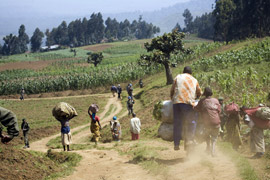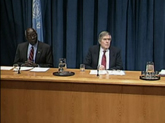Work of the Office
Country situations
The Office of the Special Advisers on the Prevention of Genocide and the Responsibility to Protect collect information on situations where there may be a risk of genocide, war crimes, ethnic cleansing and crimes against humanity, based on the risk factors outlined in the Framework of Analysis for Atrocity Crimes . Due to the sensitive nature of the mandate, much of the Office’s work remains outside of the public eye. However, when the Special Advisers assess that making their concerns public will reduce the risk of atrocity crimes in a specific situation, they do so by issuing public statements and upon request, by briefing the Security Council.
 2011-2012: Syria
2011-2012: Syria
Following reports of human rights violations by Syrian security forces in March 2011, the Office began to monitor the violent suppression of anti-government protests there. The alleged systematic and widespread attacks by police, military and other security forces appear to have primarily targeted the civilian population. In addition to the deaths of protestors, there have also been reports of mass arrests, arbitrary detentions, disappearances, and other grave human rights violations in towns where protests have taken place. Based on the available information, the Special Advisers consider that the scale and gravity of the violations may amount to crimes against humanity.
On 2 June 2011 and on 21 July 2011, the Special Advisers issued statements expressing concern at persistent reports of widespread and systematic human rights violations by Syrian security forces. They joined the international community in calling for an end to the violence, for an independent investigation of the alleged crimes and for the government to allow humanitarian access to affected areas. On 10 February 2012, Special Advisers Deng and Luck expressed concern at reports of growing tensions between different sectarian communities in Syria. They called on all parties to take immediate steps to ensure that the human rights of all individuals are respected and protected, regardless of their religious identity or political affiliation.
On 15 March 2012, Special Advisers Deng and Luck expressed grave concern at the Syrian Government’s increasingly violent assault against its population and deepening sectarian divisions. The Special Advisers stated that the lack of unified international response to protect the Syrian population has encouraged the Government to continue its course of action. Reiterating their calls for an end to the violence, the Special Advisers also called on the international community to take collective action to protect populations at risk of further atrocity crimes in Syria.
On 14 June 2012, Special Adviser Deng and Luck expressed alarm at widespread reports of mass killings as a result of attacks by Government artillery and tanks on residential neighbourhoods, as well as alleged attacks against civilians and civilian infrastructure by pro-government militia and other armed groups. They noted that these mass killings underscored the Syrian Government’s manifest failure to protect its populations and called for all parties to immediately end all acts of violence and human rights violations against the Syrian population. The Special Advisers stated that the risk of further mass atrocity crimes was high, with increasing violence and deepening sectarian tensions, and called for immediate, decisive action.
On 20 December 2012, Special Adviser Adama Dieng, issued a statement warning of the increasing risk of sectarian violence in Syria. Expressing concern that entire communities could suffer the consequences for crimes committed by the Syrian Government, the Special Adviser warned that there was a particular risk that communities, including Alawite and other minorities perceived to be associated with the Government, its security forces, militias and allies, could be subject to large scale reprisal attacks. Mr. Dieng urged all parties to adhere to international humanitarian and human rights law and to condemn hate speech that could constitute incitement to violence against any community.
 2011-2012: Sudan and South Sudan
2011-2012: Sudan and South Sudan
Since the independence of South Sudan in July 2011, the Government of Sudan has embarked on a military campaign in transitional areas perceived to be allied to South Sudan. The Government has dissolved the civilian administration in Abyei and Blue Nile and placed them under military control. The fighting between the Sudan Armed Forces (SAF) and the Sudan Peoples Liberation Army-North (SPLA-North) in Abyei, Southern Kordofan and Blue Nile has resulted in the killing and forced displacement of civilians. According the High Commissioner for Human Rights, the SAF has deliberately targeted the civilian population in Southern Kordofan and Blue Nile, committing serious human rights violations that could be considered as crimes against humanity and ethnic cleansing.

Aftermath of attack on Abyei town
(UN Photo/Stuart Price)
The risk of violence in the Abyei region remains particularly acute, with implications for stability in the country as a whole, in line with the provisions of the Comprehensive Peace Agreement of 2005, another referendum was to be held for the people of Abyei to decide whether to remain under the administration of the North or join the South. Because the parties have not agreed on the details of the process, that referendum has not yet been conducted. The Office remains alert to the risk of reprisals against Southerners living in the North, the unresolved conflict in Darfur and the future of Southern Kordofan and Blue Nile, where popular consultations on their status under the CPA are to be conducted.
In close consultation with UN partners, the Office of the Special Adviser continues to assess the risk of genocide, war crimes, ethnic cleansing and crimes against humanity in Sudan and provide specific recommendations for preventive action.
On 16 March 2011, the Special Advisers on the Prevention of Genocide and the Responsibility to Protect issued a statement expressing concern at the increase of tensions in Abyei and urged parties to ensure the free, unhindered and expeditious movement of peacekeepers and staff of the United Nations Mission in Sudan so that the Mission can implement its mandate, including for the protection of civilians, internally displaced persons, and other vulnerable groups.
On 25-29 July 2011, shortly after the independence of South Sudan, the Office conducted seminars in Juba for UN officials, civil society groups, and the Government of South Sudan. Participants included officials from the South Sudan Human Rights Commission, the Judiciary, the Ministry of Justice and the Sudan Peoples Liberation Army. The Office’s training program aims to assist states that are emerging from crises.
On 7 September 2011, Special Advisers Francis Deng and Edward Luck issued a second statement on the situation in Southern Kordofan and Blue Nile states. The Special Advisers reminded the Government of Sudan of its responsibility to protect its populations – irrespective of their ethnic, religious or political affiliation – from genocide, war crimes, ethnic cleansing and crimes against humanity and called for an immediate end to the violence.
 2011: Libya
2011: Libya
The Special Advisers issued a statement on 22 February 2011 expressing alarm at the reports of systematic attacks against the civilian population in the Socialist People's Libyan Arab Jamahiriya by military forces, mercenaries, and aircraft. The Special Advisers noted that, if the nature and scale of such attacks were confirmed, such grave violations of international human rights and humanitarian law could constitute crimes against humanity. The Office also invoked the principles of the Responsibility to Protect and reminded the Libyan Government of its pledge to protect populations by preventing genocide, war crimes, ethnic cleansing, and crimes against humanity, as well as their incitement.
The Office continues to monitor closely both the situation in Libya and the response of the international community to implement Security Council Resolutions 1970 and 1973 (2011).
For an informal discussion with Mr. Edward Luck about the Responsibility to Protect and the situation in Libya, please see part one and part two of a video interview conducted by the International Coalition on the Responsibility to Protect in October 2011.
 2011: Electoral crisis in Côte d’Ivoire
2011: Electoral crisis in Côte d’Ivoire
A serious crisis ensued after the 28 November 2010 presidential election as a result of the refusal of former President Laurent Gbagbo to hand over power to Alassane Ouattara, who was recognised internationally as having won the elections. Political affiliation is historically linked to ethnic, national and religious identity in Côte d’Ivoire. The former President used allied troops, paramilitaries and mercenaries to entrench his position and attacked those perceived to support Ouattara. While violence primarily remained political, incidents were reported in which civilians were targeted on the basis of their ethnic/religious affiliation and/or perceived nationality, particularly by the pro-Gbagbo forces and his supporters. In addition, incitement to violence by pro-Gbago officials was a significant factor in the conflict. These acts heightened the risk of atrocities being committed in Côte d’Ivoire. Mr. Gbagbo was arrested on 11 April 2011 and authority was handed over to President Alassane Ouattara. A national investigation has been initiated into human rights violations and abuses that took place during the crisis, including unlawful killings, rape, forced disappearances, excessive use of force and incitement to violence, with the aim of establishing the facts and promoting accountability. The International Criminal Court has also initiated an investigation and will prosecute those individuals found to have born the greatest responsibility for the most serious crimes and violations that were committed.
Special Advisers Deng and Luck twice highlighted the risk of genocide, war crimes, ethnic cleansing and crimes against humanity (29 December 2010, 19 January 2011) and reminded all parties of their responsibility to prevent these crimes, including their incitement. They continue to monitor the situation, in close consultation with UN partners.
 2010: Inter-group tensions in Guinea
2010: Inter-group tensions in Guinea
In March 2010, Special Adviser Francis Deng undertook a mission to West Africa, during which he visited Guinea, at the Transitional Government’s invitation. Since the violent attack on the opposition Forces Vives rally on 28 September 2009, inter-ethnic tensions had been growing. The Office investigated the extent to which such tensions could be a threat to peace and stability in Guinea and the potential for genocidal violence, especially in the 2010 election and post-election periods. The Special Adviser concluded that the risk of genocidal violence existed and was moderate. A report of his findings was made public in June 2010.
The Special Adviser’s findings were based on field research conducted by accompanying staff members in Conakry and the Guinée Forestière region. Consultations were held with key actors in both locations, including religious leaders, councils of elders (from the four regions), civil society experts, women’s groups, ECOWAS and the UN Country team. Francis Deng discussed the situation with the Transitional Government, including Prime Minister Jean Marie Doré and several of his ministers.
On 3 November 2010, ahead of the run-off for the presidential election scheduled for 7 November, the Secretary-General warned political leaders against exploiting ethnicity, religion or any other divisive factor for political ends, and reiterated that those responsible for fomenting violence or violating human rights must be held accountable. He also reminded the Transitional Government of Guinea of its responsibility to protect and ensure the safety of all Guineans, regardless of their ethnicity, religion or political affiliation.
The Office and UN partners are working closely to ensure that the UN system is taking steps to assist the Government to improve inter-group relations and national cohesion in Guinea.
 2010: Inter-group violence in Kyrgyzstan
2010: Inter-group violence in Kyrgyzstan

Kyrgyz soldiers transport a family to a secure part of Osh, Kyrgyzstan, during violent clashes between Uzbeks and Kyrgyz in June 2010. (UN Photo/EPA)
In April 2010, the ouster of President Kurmanbek Bakiyev brought ethnic tensions to the surface in Kyrgyzstan, particularly between the Kyrgyz and Uzbek communities in the south. On 10 June 2010, there was an eruption of violence in the South, resulting in killings, destruction of property and mass displacement. On 15 June 2010, Special Advisers Francis Deng and Edward Luck released a statement on the situation. They expressed concern that the pattern and scale of the violence, which resulted in the mass displacement of Uzbeks from South Kyrgyzstan, could amount to ethnic cleansing, and called on the Interim Government, with the assistance of the international community, to uphold its obligation to protect its population.
Serious protection concerns remain for the Uzbek population and other minorities in Kyrgyzstan who face continued discrimination, harassment and marginalization. As the root causes of the violence remain unaddressed, the Office considers that there is a great risk of renewed violence. On 27 and 29 March 2011, the Office organized a training seminar in Kyrgyzstan for UN country teams and civil society in Central Asia. Participants learned about genocide and mass violence from a socio-historical approach. Drawing on historical and contemporary case studies, participants learned about preventive options to mitigate the risk of genocide during normal times and during impending crises.
In February 2012, the Office supported online training for civil society organizations operating in Kyrgyzstan on how to use an online mapping system developed by Ushahidi Inc. to track incidents that could constitute possible precursors to or represent early warning indicators of the risk of atrocity crimes in Kyrgyzstan. The objectives of the training were to equip civil society organizations with the capacity and tools required to monitor situations at risk of genocide and related crimes, to improve communication and information exchange among organizations and to alert relevant actors to respond in a timely manner. The Office continues to work with regional and international partners to assist the Government in ensuring the safety of the population of Kyrgyzstan and is looking at ways to respond to requests for further cooperation and assistance to strengthen early warning and response capacity.
 2009: Inter-group violence in Sri Lanka
2009: Inter-group violence in Sri Lanka
In January 2009, the Sri Lankan military undertook a significant military offensive against the Liberation Tigers of Tamil Eelam (LTTE) rebels. The military defeat of the rebels in May 2009 brought to an end a conflict which had raged for 26 years. During these months, thousands of civilians were reportedly killed and there were serious allegations against both parties to the conflict of violations of international human rights and humanitarian law. On 15 May 2009, the Special Adviseron the Prevention of Genocide issued a public statement and published an Opinion Editorial reminding the parties to the conflict in Sri Lanka of these obligations and urging that they be upheld.
 2008: The situation in North Kivu
2008: The situation in North Kivu

Residents go about their daily business,
North Kivu,
the Democratic Republic of the Congo,
23 June 2008. (UN Photo)
In response to reports of ethnic-based violence in the Democratic Republic of the Congo, the Office of the Special Adviser began to monitor the situation in January 2008 by collecting information from within the United Nations system, non-governmental organizations and other public and private sources. While acknowledging that there are several provinces in the Democratic Republic of the Congo that could be of concern to his mandate, the Special Adviser chose to conduct a mission and focus his analysis on the situation in North Kivu in view of the dramatic deterioration of the situation there starting in October 2008. From 22 November to 5 December 2008, the Special Adviser and his Office undertook a mission to the Great Lakes Region, including to Uganda, Rwanda, Burundi and the Democratic Republic of the Congo, focussing on the situation in North Kivu.
In a report [S/2009/151] conveyed to the Security Council by the Secretary-General on 5 March 2009, the Special Adviser added his voice to others by underlining that the root causes of the conflict in the eastern part of the Democratic Republic of the Congo were primarily political and economic, not related to identity. However, extreme ethnic polarization and hatred have become associated with the conflict and the risk of ethnic targeting in North Kivu was significant as at the end of 2008. In particular, many groups spoke about alleged past and on-going “genocides” and referenced these to predict future genocides in the region, in particular against the Tutsi, who are popularly viewed as the principal perpetrators of mass atrocities. Ethnically motivated killings by armed groups and the escalation of genocidal hysteria among the civilian populations were deemed likely, dangerous and would have serious regional implications.

